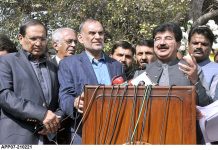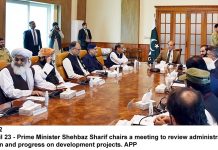In an interview with a private television channel, former Federal Minister Asad Umar emphasized the urgent need for political dialogue in Pakistan, asserting that economic stability is unattainable without political consensus.
He urged the current government to engage in discussions with the opposition, highlighting that the nation’s challenges can only be resolved through parliamentary negotiations.
Umar expressed concern over the internal divisions within his former party, Pakistan Tehreek-e-Insaf (PTI), noting that such differences should not be aired publicly.
He criticized the ongoing hostile exchanges on social media among party members, suggesting that these actions undermine the party’s unity and public image.
Reflecting on past political decisions, Umar acknowledged that PTI’s refusal to negotiate with the Pakistan Democratic Movement (PDM) was a significant misstep. He emphasized that consensus and dialogue are essential for the country’s progress, stating that the solution to Pakistan’s problems does not lie with a single political party but requires collective effort.
Umar also called for a “new charter of democracy,” advocating for engagement between politicians and the establishment to address the prevailing political turmoil. He stressed that a strong parliament is crucial for a strengthened democracy and that political understanding is necessary for the country’s advancement.
Regarding the current government’s tenure, Umar expressed skepticism about its ability to complete its term, citing widespread uncertainty and lack of confidence among the populace. He reiterated that immediate elections are the only viable solution to the ongoing political and economic crises, urging the government to consider this path to restore stability.
Umar’s remarks underscore the pressing need for political reconciliation and institutional cooperation to navigate Pakistan through its current challenges.
Separately, Khyber Pakhtunkhwa Information Adviser Barrister Saif on Saturday welcomed the federal government’s decision to initiate dialogue with Afghanistan, adding that although the decision has come late, it is a positive step in the spirit of “better late than never.”
In his statement, Saif said that the KP government had repeatedly urged the federal government to start negotiations with Afghanistan in order to take effective steps toward ending terrorism and bringing peace to the region.
He emphasised that KP was on the front line in the fight against terrorism and that it was the most affected province. Therefore, ignoring the province in this sensitive process reflects a lack of seriousness.
“The KP government had sent “Terms of Reference” (TORs) to the federal government three months ago for initiating dialogue with Afghanistan. These TORs stressed including tribal elders and all stakeholders in the process,” he added. According to him, the TORs could help make the negotiation process meaningful and successful.
He clarified that without taking all stakeholders into confidence, the dialogue process could not be fruitful. “If the government genuinely wants lasting peace in the region, it must seriously include the Khyber Pakhtunkhwa government and other affected parties in the consultation process.
I hope that the federal government will now adopt a more serious approach and work with all relevant parties to develop a comprehensive strategy so that lasting and sustainable peace could be achieved through negotiations with Afghanistan,” he concluded.









